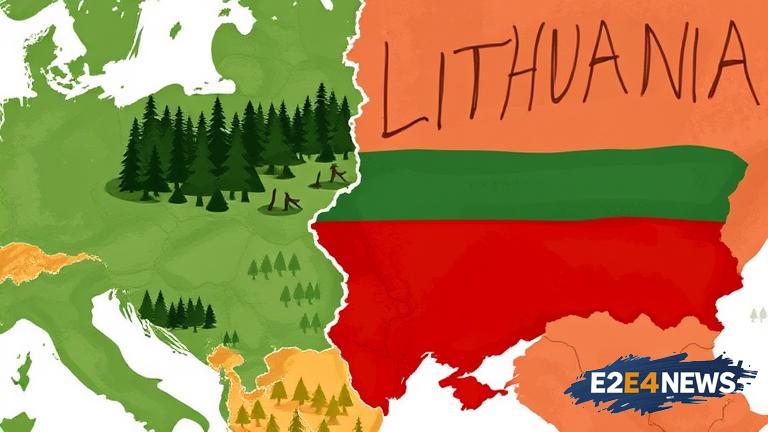The Lithuanian-Belarusian border has been at the center of a growing controversy in recent months, with reports emerging of widespread deforestation and the pushback of migrants attempting to cross into Lithuania. The situation has sparked concerns over human rights and environmental degradation, with many calling for greater transparency and accountability from the Lithuanian government. The deforestation, which has been ongoing for several months, has resulted in the clearance of hundreds of hectares of forestland, with many trees being cut down to make way for a planned border fence. The fence, which is intended to prevent migrants from crossing into Lithuania, has been criticized by many as a symbol of the country’s increasingly hardline stance on immigration. Despite the controversy surrounding the fence, the Lithuanian government has pressed ahead with its construction, citing concerns over national security and the need to protect the country’s borders. However, many have questioned the effectiveness of the fence in preventing migrant crossings, pointing out that it may simply drive migrants to attempt more dangerous and illegal routes. The pushbacks of migrants, which have been reported by numerous human rights organizations, have also sparked widespread condemnation. Many have criticized the Lithuanian government for its treatment of migrants, citing reports of violence, intimidation, and forced returns. The situation has been further complicated by the COVID-19 pandemic, which has placed a significant strain on Lithuania’s healthcare system and led to increased tensions between migrants and local communities. Despite these challenges, many have called for the Lithuanian government to take a more compassionate and humane approach to migration, citing the need to protect the human rights of all individuals, regardless of their nationality or immigration status. The controversy surrounding the Lithuanian-Belarusian border has also sparked a wider debate over the EU’s migration policies, with many calling for greater reform and a more coordinated approach to addressing the root causes of migration. The situation has also highlighted the need for greater cooperation and dialogue between EU member states, as well as with non-EU countries, in order to address the complex challenges posed by migration. In recent months, the Lithuanian government has faced increasing pressure from the EU and other international organizations to address the human rights concerns surrounding the pushbacks and deforestation. The government has responded by announcing a number of measures aimed at improving the treatment of migrants and reducing the environmental impact of the border fence. However, many have questioned the effectiveness of these measures, citing concerns over the government’s commitment to upholding human rights and protecting the environment. The situation at the Lithuanian-Belarusian border serves as a stark reminder of the need for a more nuanced and compassionate approach to migration, one that balances the need to protect national security with the need to uphold human rights and protect the environment. As the situation continues to unfold, it is likely that the controversy surrounding the Lithuanian-Belarusian border will only continue to grow, highlighting the need for greater transparency, accountability, and cooperation from all parties involved. The international community must come together to address the complex challenges posed by migration, and to ensure that the human rights of all individuals are protected and respected. This includes providing support and resources to countries affected by migration, as well as working to address the root causes of migration, such as poverty, conflict, and climate change. By working together, we can create a more just and equitable world, one that balances the need to protect national security with the need to uphold human rights and protect the environment. The Lithuanian-Belarusian border crisis serves as a call to action, highlighting the need for greater cooperation and dialogue in addressing the complex challenges posed by migration. It is only by working together that we can create a more compassionate and humane approach to migration, one that protects the human rights of all individuals and promotes a more sustainable and equitable world. The situation at the Lithuanian-Belarusian border is a complex and multifaceted issue, one that requires a nuanced and comprehensive approach. It is not just a matter of building a border fence or pushing back migrants, but rather of addressing the root causes of migration and creating a more just and equitable world. This requires a commitment to upholding human rights, protecting the environment, and promoting sustainable development. It also requires a willingness to work together and to engage in dialogue and cooperation, both within and between countries. By taking a more comprehensive and nuanced approach to migration, we can create a more just and equitable world, one that balances the need to protect national security with the need to uphold human rights and protect the environment.
